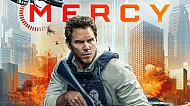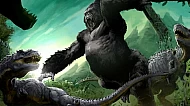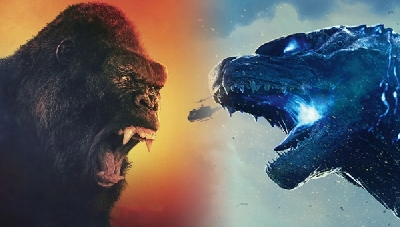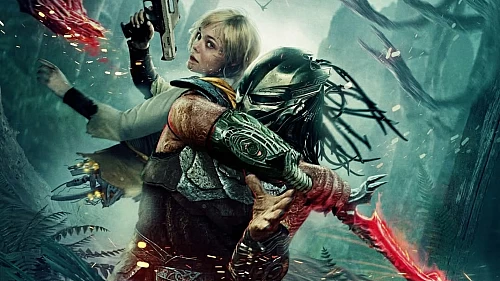Godzilla has never shied away from powerful metaphors and with the upcoming release of Godzilla vs Kong, audience members look forward to discovering how the latest instalment of the MonsterVerse franchise will reflect the biggest dangers facing the world.
Originally scheduled to be released in November 2020, Godzilla vs Kong has been pushed until May 21, 2021 as a consequence of the COVID-19 pandemic. The fourth film in the MonsterVerse series – following Godzilla (2014), Kong: Skull Island (2017), and Godzilla: King of the Monsters (2019) – will be concurrently released in movie theaters and on HBO Max.
Although the movie is set for release in just a few months and is all but ready for viewing, MonsterVerse fans have been left waiting patiently for an official trailer. All there is to go on is the film’s premise…
“In a time when monsters walk the Earth, humanity’s fight for its future sets Godzilla and Kong on a collision course that will see the two most powerful forces of nature on the planet collide in a spectacular battle for the ages. As Monarch embarks on a perilous mission into uncharted terrain and unearths clues to the Titans’ origins, a human conspiracy threatens to wipe the creatures, both good and bad, from the face of the earth forever.”
While specific plotlines and the outcome of this “collision course” will only truly be discovered upon viewing, it does give MonsterVerse fans a few hints as to the themes that will be represented in Godzilla vs Kong.
Brief History of Godzilla Themes
Before analyzing the metaphors expected to be prevalent in Godzilla vs Kong, it’s important to understand how themes have been a key factor in past movies, dating back to the original Godzilla, all the way through to the Hollywood MonsterVerse franchise.
The 1954 Godzilla was a clear and obvious representation of the atomic bombs that the US dropped on Japan nine years earlier to end the Second World War and, in the process, kill more than 100,000 people.
As for the rebooted Hollywood franchise that kickstarted the MonsterVerse series, 2014’s Godzilla continued along the theme of the consequences of nuclear disasters while also incorporating the dangers of natural catastrophes. "For the last 10 years, there have been these horrific situations and the visuals from those moments have just scarred everyone's minds," said Godzilla director Gareth Edwards said at the time, referring to the 2004 Indian Ocean tsunami, Hurricane Katrina in 2005, and the 2011 Fukushima nuclear disaster.
The 2014 Kong: Skull Island is set in the aftermath of the Vietnam War and, while the direct references are to the trauma and consequences of that specific conflict, it can also be applied to more recent wars and invasions and the unwelcome occupation of armed forces in foreign lands. The theme of humankind’s powerlessness when faced with natural forces beyond control are also addressed.
Godzilla: King of the Monsters will once again take on those themes of Man vs Nature – a battle with only one outcome.
Godzilla vs Kong Themes
So how will the familiar themes of destruction and disaster play out in Godzilla vs Kong? To accurately analyze this, one must pinpoint the biggest current dangers posed to the future of human survival.
Undoubtedly, the environment and humankind’s minimal and ineffective action to protect the planet will again play a central role in the latest movie. As dates to halt the irreversible effects of climate change approach ever closer, humans will soon come face to face with the consequences of their damaging actions.
As the Godzilla vs Kong premise reveals, “the two most powerful forces of nature on the planet collide”, but this is not merely pitting giant monsters against each other. More it suggests a representation of a collision between nature itself and the planet. Placed hopelessly and disposably in the middle are human beings who, while responsible for this collision, are powerless to stop it.
Think of all the human damage caused to the planet and each other and it all stems from power and greed. Such greed and hunger for financial gain has permeated nearly all facets of society: from serious and egregious actions – like the invasion of countries and excessive burning of fossil fuels – to seemingly innocuous things, such as the desire for ever-new consumer technologies or playing the lottery.
Take playing the lottery, for example. The chances of winning the United States Mega Millions (which can have a jackpot of hundreds of millions of dollars) are 1 in 302,575,350.20, yet many people still pay hundreds of dollars every week in the hope of becoming an overnight multi-millionaire. Why is that? Because we live in a world where money is valued higher than most other facets of society.
This desire for monetary wealth and the possessions it affords has only intensified in recent years with an increasing divide between rich and poor: where happiness and fulfillment are measured not in dignity and respect, but by the size of one’s house, speed of their car, or follower counts on social media.
The ultimate result of this greed plays out in further destruction of the natural world, which is sure to be reflected in Godzilla vs Kong.
Another interesting metaphor that could be explored, based on the premise, is that of the “human conspiracy” that threatens to wipe the creatures of the face of the earth. Given how reflective past Godzilla movies have been of current affairs, it would be no surprise if the whole phenomenon of conspiracy is represented in Godzilla vs Kong. This has been an era of “Fake News”, where truth has become subjective and politicised, and therefore conspiracy theories have become mainstream – and authenticated by some of the most powerful people in the world. The effects of this have seen deeper social tensions, angrier political discourse, and yes, you guessed it, even more damage inflicted on the environment.
How the impact of conspiracy plays out, in addition to the latest take on the destruction of nature and humankind’s role in these areas, will be fascinating to see. On May 21, 2021 all will be discovered.

CryptoEasily launches stable-yield cloud mining contracts, creating a new way for BTC and XRP holders to earn $7,700 per day.
As the price of Bitcoin and the value of XRP continue to decline, with Bitcoin falling below $75,000 and XRP dropping to around $1.50, market sentimen...

Pluribus Creator Intended to Riff Off Genre Headliners, But Perhaps Didn’t Expect This Connection
From the creator of Breaking Bad and Better Call Saul, expectations were notably high for the Apple TV+ release of Pluribus. The platform’s risi...

Watch 2 new Mercy (2026) movie clips ahead of the film's January 23rd release date!
Amazon's MGM Studios have just released 2 new movie clips from Mercy starring Chris Pratt and Rebecca Ferguson.

Stranger Things Season 5 Episode 7 suffers big drop in ratings ahead of the series finale!
Season 5 saw a sharp drop in ratings at the conclusion of Episode 7 – The Bridge, with many fans disappointed by drawn-out scenes and questionable writing.

Weta Workshop share King Kong concept art to commemorate film's 20th anniversary!
Take a look back at some awesome early artwork created for Peter Jackson's iconic King Kong movie!


